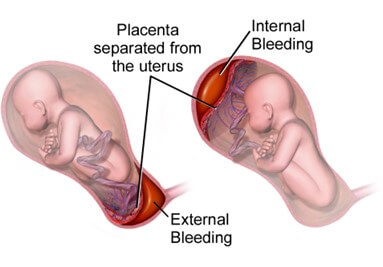A nurse is teaching a client with gestational hypertension about the signs and symptoms of placental abruption.
Which of the following statements by the client indicates a need for further teaching?
“I should report any vaginal bleeding to my provider.”
“I should monitor my blood pressure at home regularly.”
“I should lie down on my left side if I have abdominal pain.”
“I should drink plenty of fluids if I have decreased fetal movement.”.
The Correct Answer is D
The correct answer is choice D. Drinking plenty of fluids if there is decreased fetal movement is wrong because it will not improve the condition of the baby or the placenta. Decreased fetal movement can be a sign of fetal distress due to placental abruption and needs immediate medical attention.
Choice A is correct because vaginal bleeding is a common symptom of placental abruption and indicates that the placenta has separated from the uterus.
Choice B is correct because monitoring blood pressure at home regularly is important for women with gestational hypertension, as high blood pressure is a risk factor for placental abruption.
Choice C is correct because lying down on the left side can improve blood flow to the uterus and the baby, and may help relieve abdominal pain caused by placental abruption.

Nursing Test Bank
Naxlex Comprehensive Predictor Exams
Related Questions
Correct Answer is B
Explanation
The correct answer is choice B. You should continue taking your antihypertensive medication as prescribed.This is because gestational hypertension can persist for several days or weeks after delivery and may increase your risk of complications such as stroke or heart failure.You should also monitor your blood pressure at home and report any abnormal readings to your provider.
Choice A is wrong because you should not avoid breastfeeding your baby unless your provider advises you to do so.Breastfeeding has many benefits for both you and your baby and does not affect your blood pressure.
Choice C is wrong because you do not need to limit your sodium intake to less than 2 grams per day unless your provider tells you to do so.There is no evidence that sodium restriction lowers blood pressure or prevents preeclampsia in pregnant women.
Choice D is wrong because you should have a follow-up appointment with your provider within one week after delivery, not six weeks.This is to check your blood pressure, review your medication, and screen for any postpartum complications.
Correct Answer is B
Explanation
The correct answer is choice B. To prevent seizures.Magnesium sulfate is primarily used for its anticonvulsive effects in treating hypertensive disorders of pregnancy.It helps to prevent and manage seizures during stabilization and until 24 hours after delivery.
Choice A is wrong because magnesium sulfate does not lower the blood pressure.It may have a mild vasodilatory effect, but it is not the main mechanism of action.Antihypertensive drugs such as nifedipine are used to lower the blood pressure in gestational hypertension.
Choice C is wrong because magnesium sulfate does not induce labor.It may have a tocolytic effect, which means it can relax the uterine muscles and delay preterm labor.
Choice D is wrong because magnesium sulfate does not increase urine output.It may cause fluid retention and edema, which are adverse effects that need to be monitored.Diuretics are used to increase urine output, but they are not recommended for hypertensive disorders during pregnancy.
Whether you are a student looking to ace your exams or a practicing nurse seeking to enhance your expertise , our nursing education contents will empower you with the confidence and competence to make a difference in the lives of patients and become a respected leader in the healthcare field.
Visit Naxlex, invest in your future and unlock endless possibilities with our unparalleled nursing education contents today
Report Wrong Answer on the Current Question
Do you disagree with the answer? If yes, what is your expected answer? Explain.
Kindly be descriptive with the issue you are facing.
